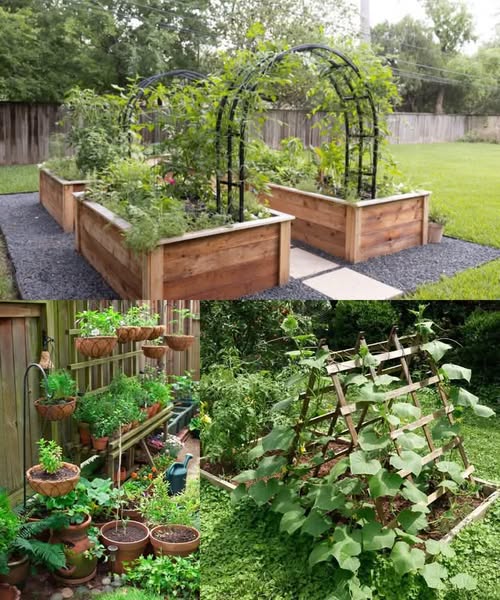Inspiring Vegetable Garden Design Ideas
1. Raised Garden Beds
Why: Control soil quality and improve drainage.
Design: Arrange beds in a grid, use materials like wood or stone, and add a pathway between beds.
Benefits: Promotes better air circulation, reduces weeds, and simplifies harvesting.
Why: Maximize space with climbing vegetables.
Design: Use trellises, wall-mounted planters, or hanging pots.
Benefits: Saves space, adds visual interest, and reduces pests.
3. Garden Paths & Walkways
Why: Divide sections and provide easy access.
Design: Create winding paths with gravel, stones, or brick.
Benefits: Improves functionality and aesthetics.
4. Companion Planting
Why: Plants that support each other boost growth and deter pests.
Design: Plant tomatoes with basil or use marigolds for pest control.
Benefits: Healthier plants and less need for pesticides.
5. Edible Landscaping
Why: Combine beauty with functionality by growing food as part of your landscape.
Design: Integrate fruit trees, herbs, and colorful veggies into ornamental beds.
Benefits: A productive, beautiful garden.
6. Greenhouse Gardens
Why: Extend the growing season and control environment.
Design: Build a small greenhouse for year-round crops.
Benefits: Controlled growing conditions and year-round harvests.
7. Hydroponic or Aquaponic Systems
Why: Grow indoors or in areas with poor soil.
Design: Set up soilless systems for crops like lettuce and herbs.
Benefits: Space-efficient, high yields, and water-efficient.
8. Wildflower and Herb Garden
Why: Enhance biodiversity and attract pollinators.
Design: Surround veggies with wildflowers and plant herbs for flavor and pest control.
Benefits: Boosts pollination and garden fragrance.
9. Modern Garden Design
Why: Minimalist, low-maintenance, and visually striking.
Design: Use geometric raised beds, simple materials like concrete, and modern touches.
Benefits: Sleek design with easy upkeep and high productivity.
